How Hollywood secretly uses AI to make key decisions about making films
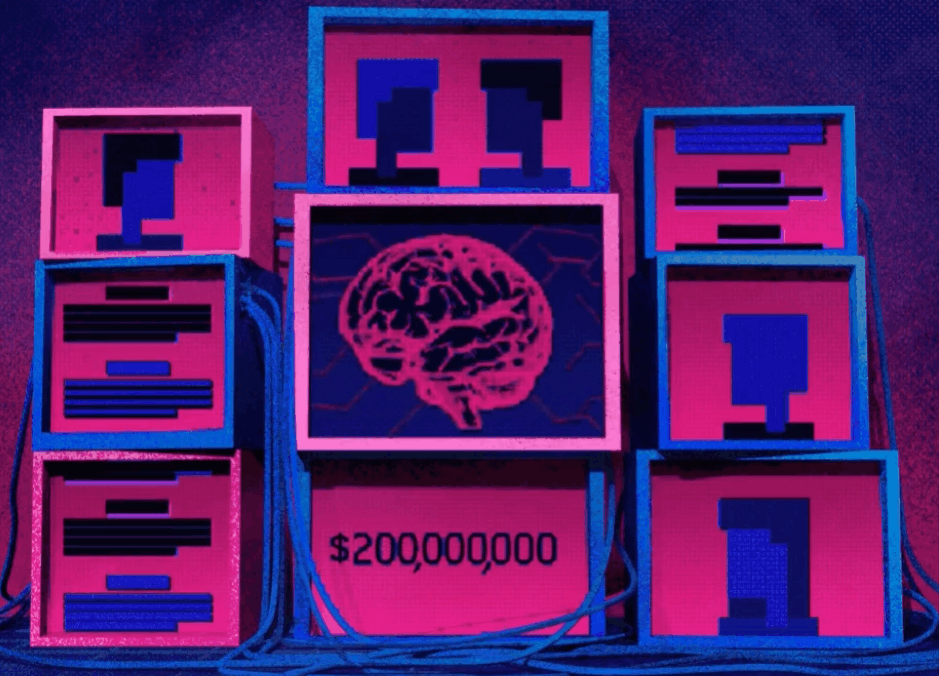
In the world of cinema is full of amazing "what if." What if it was not Keanu Reeves who appeared in The Matrix, but Will Smith, who was offered the role in the first place? What if Nicolas Cage could still play Superman in a Tim Burton movie? Would these films be successful, would they become part of the franchise? Actors, directors and producers are constantly forced to make decisions that change the fate of the entire industry.
For people who have hundreds of millions of dollars at stake, relying on luck and instincts is not an option. If casting some other actress in the role of Wonder Woman can bring them an extra few tens or hundreds of millions - they should know about it. That is why in recent times Hollywood has begun to use artificial intelligence systems to predict which films can be successful and which ones will fail at the box office. Moreover, the AI is now even responsible for some key decisions: which actor to choose, which director is appropriate, and which scenarios are worth making a lot of money on.
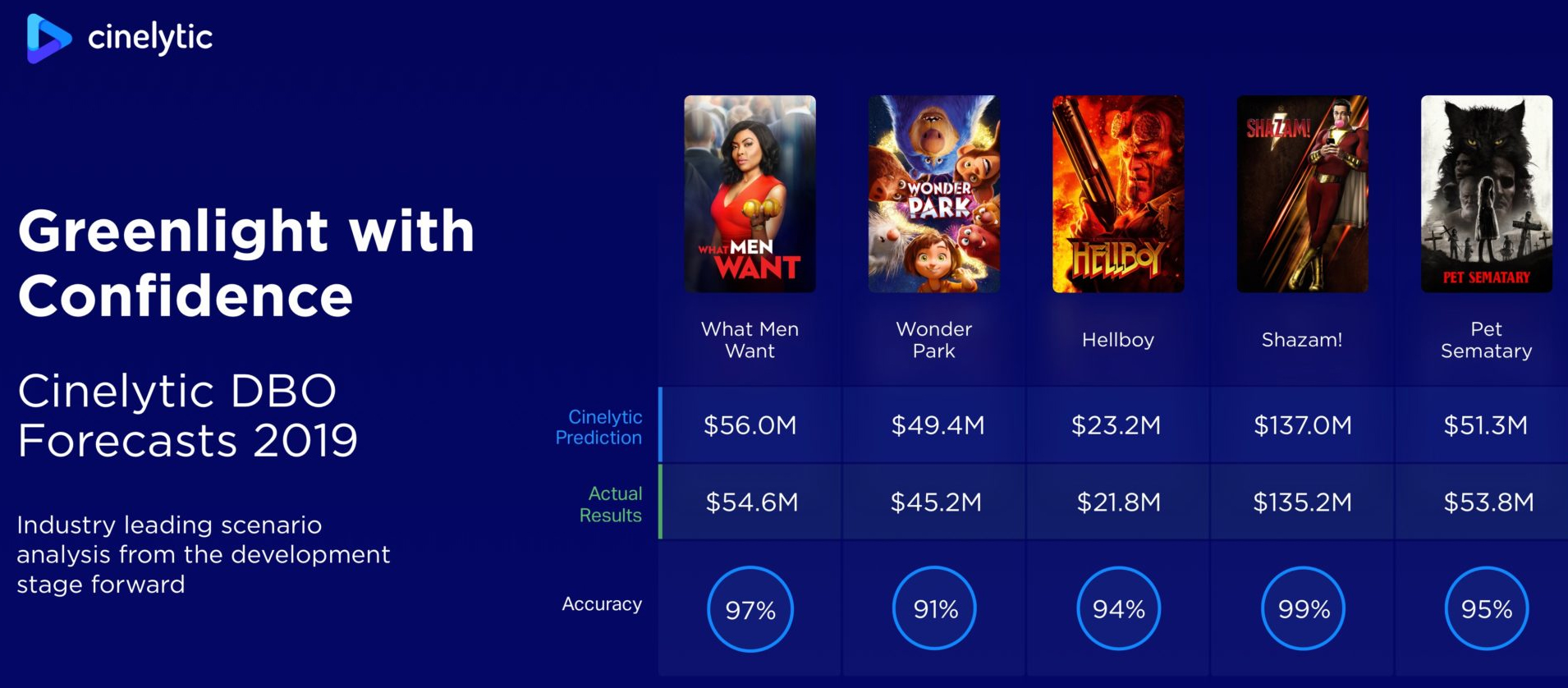
Los Angeles-based Cinelytic startup is one of many companies offering AI systems for Hollywood. Their machine intelligence acts as a producer. He collects all historical information about the profitability of films, and analyzes all factors. Who filmed, who filmed what was the film, what raised the topic. The algorithms trained by machine learning find hidden patterns in the information. It may turn out, for example, that romance with Meg Ryan is always a success. But if you hire the director Wes Anderson for such a project - his expected profit falls by $ 47 million.
As a result, producers can play fantasy football with their future film, picking characters up to minor and third-rate, their “coaches” directors, cinematographers, composers and all the rest. The quality of the film, of course, is not taken into account - mainly because it has long been not the most decisive factor in the fees. A good poster, a suitable release date, actors who “bring in” their audience, a well-known franchise often give a much more substantial effect.
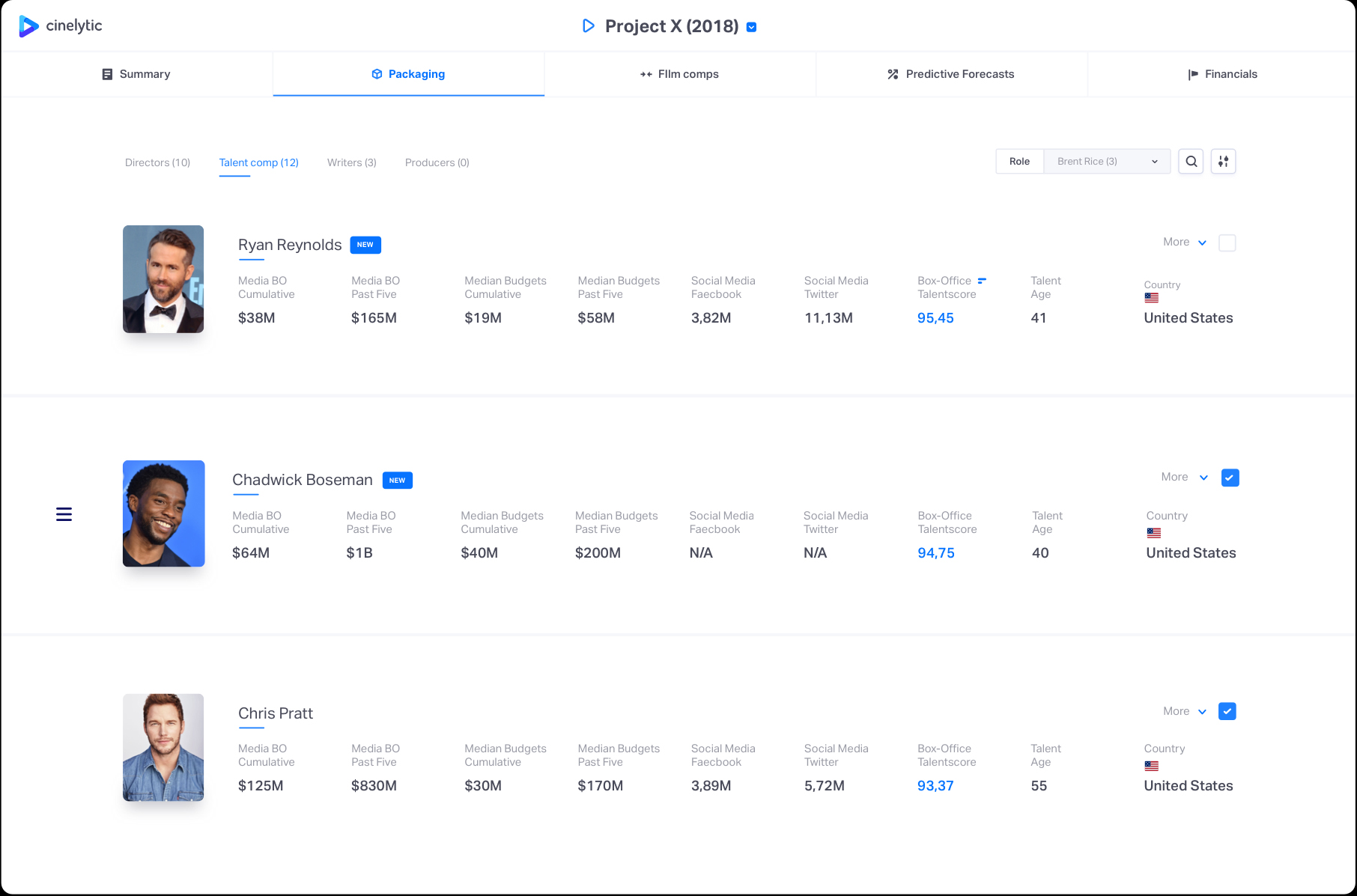
')
This may explain, for example, why low-grade comedies with Adam Sandler, who are so “loved” by film critics, are still being released, and with enviable regularity, several pieces each year. Or why Transformers, despite its traditionally low ratings on all portals, has already been approved before the tenth film.
Cinelytic co-founder Tobias Keisser explains:
You can compare them separately, or compare them in a package. Model, for example, scenarios with Emma Watson or Jennifer Lawrence, and see for this particular film what will be better sold in different countries.
Cinelytic is not the only company offering AI solutions for Hollywood. In the past few years, a whole group of firms with similar projects has appeared. For example, ScriptBook from Belgium, founded in 2015, says that its algorithms are able to predict the success of a movie based on its script. Moreover, all the details are indicated: the expected rating, the percentage of female audience, how much people will like the main character, and, of course, what the profit will be. The creators of the company say that the error of their AI is usually within 18%. Not a bad result, given that Hollywood producers often miss several times.
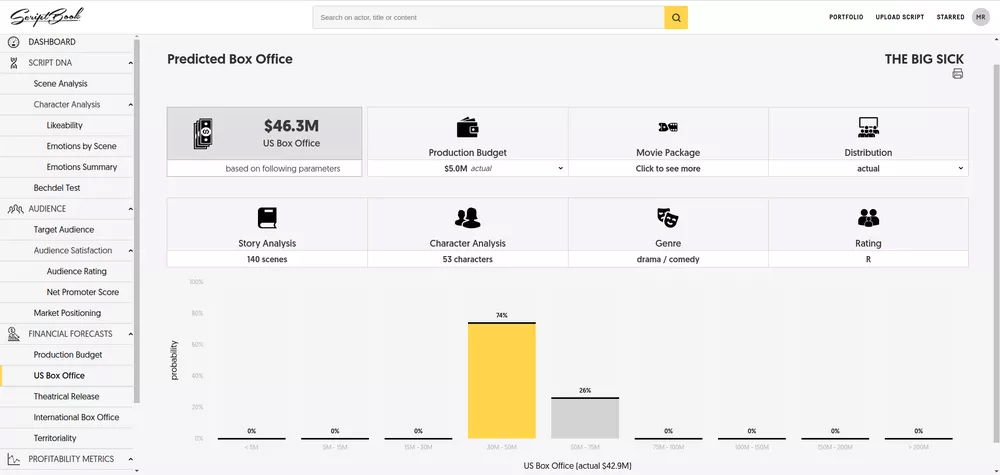
For example, the algorithm was fed 62 scenarios approved by studios. ScriptBook calculated that 40 of them will be successful, and 22 should not be approved. Of these 22 films, all 22 eventually failed at the box office. Of the 40 films approved by the algorithms, 30 were successful, another 10 turned out to be unprofitable, but without serious losses. The ScriptBook team says that probably in the case of these 10 films, it’s worth blaming the wrong marketing, or a bad time to film (competition with something more popular).
Israeli startup Vault helps with demographics. Here, however, the film must already be approved, and even a teaser trailer is released on it. Analyzing who liked this trailer in social networks, the system helps to correctly identify its key audience. And to make sure that after watching the second, “main” trailer, they will definitely come to the cinema. The system has been trained on more than 30 years of data about films, their profits, casting, and audience.
Pilot uses AI and machine learning algorithms, again, to predict revenue. Predictions work even 18 months before the movie’s release. Moreover, their accuracy is phenomenal: within just a few million! It is interesting to see for which films the program was wrong in what direction. For example, “Despicable Me 3”, in her opinion, in the USA should have raised $ 7– $ 10 million more. "Baby on the drive" - $ 3 million less. And the failure of the comedy “ Operation Casino ” was predicted by the system down to the smallest detail, literally within the limits of $ 100 thousand. Had the leaders of Warner Bros. trust the algorithms, they would save a few tens of millions.

"Operation" Casino "did not bring money to its creators
Not everyone wants to rely on third-party companies, revealing information about their scenarios and the desired actors. Therefore, large Hollywood studios often develop similar systems themselves. Last November, “The Twentieth Century Fox” talked about how it uses AI to identify objects and scenes inside trailers to figure out what the audience will like. The work of researchers from the company can be read here (PDF). The system is called "Merlin", and helps the company decide how much to allocate money for the promotion of a project.
"Merlin" shows good accuracy, although even without embarrassment there was a cost. For example, the system analyzed the film “Logan” (rather unusual for superhero action movies), and produced a list of films that most likely would find a response from the same audience. The results of “Merlin” were compared with the responses of users received at the exit from the cinema halls.
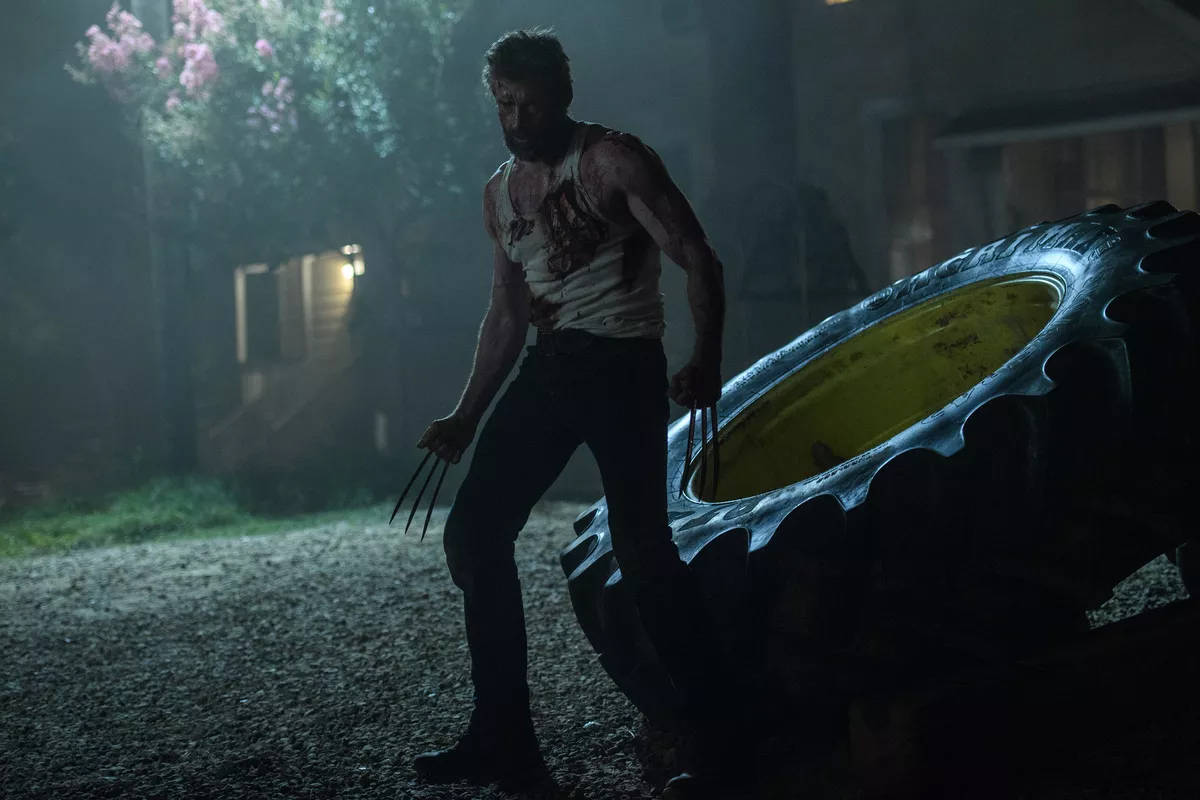
Among them were many accurate hits. For example, “Merlin” said that these same people would probably cast a spell over “John Wick” and “The Magnificent Seven” (although they, it would seem, were not even about superheroes, how did he understand this?). But “Tarzan.” Legend ”, which the real audience was not exactly going to go. Cause? Both films were assigned similar tags by the car, and, apparently, it seemed to her that in sum these two films were about the same thing. They received such tags as “a lot of hair on the head”, “beard”, “fight”, and, most importantly, “tree”. And in the "Logan" and "Tarzana. Legend "there were a lot of trees, and fighting scenes took place in the forest. And this means, in the opinion of the great “Merlin”, that films are alike!

Maybe Merlin is right?
Obviously, the system still cannot be trusted 100%. But the leaders of the “Twentieth Century Fox” said that the advantages outweigh the disadvantages, and the algorithms will obviously become even smarter with time, and will learn to distinguish the main factors from the secondary ones.
Cinelytic's Tobias Keisser thinks studios could adapt a new approach even faster:
On the set now - robots, drones, green and blue screens. This is super high technology. But the business side of things has not evolved over 20 years. People still use Excel and Word, they have very simple business methods. Many rely on personal knowledge, analytics and data collection virtually none.
Of those systems that were interviewed by The Verge, no one wanted to share their predictions: this could damage their contracts with current studios. Only ScriptBook sent its predictions for films released in 2017 and 2018. The algorithms there turned out to be much more successful than real people making decisions. Of the sample of 50 films, including such unusual ones as Reincarnation, Silent Place and First Player Prepare, only 44% received a profit, most failed. The ScriptBook system was right in 86% of cases. “Accuracy is twice as high as that of the current industry!”
but on the other hand
Academic work published on this topic in 2016 also predicts that such algorithms will be able to produce reliable and accurate predictions about the success of films, based on information about the plot, directors and actors. But Kang Zhao, one of the authors of the work, warns that such statistical approaches have their drawbacks.
The first minus - often such predictions are already obvious. You don't need to be a genius to predict that a film with Leonardo DiCaprio or Tom Cruise will raise more money than the same movie without them. And the unprofitable films, in which the studios were mistaken, often have no big celebrities at all, they simply have the wrong budget. So there is no reason to analyze the “profitability” of the actors.
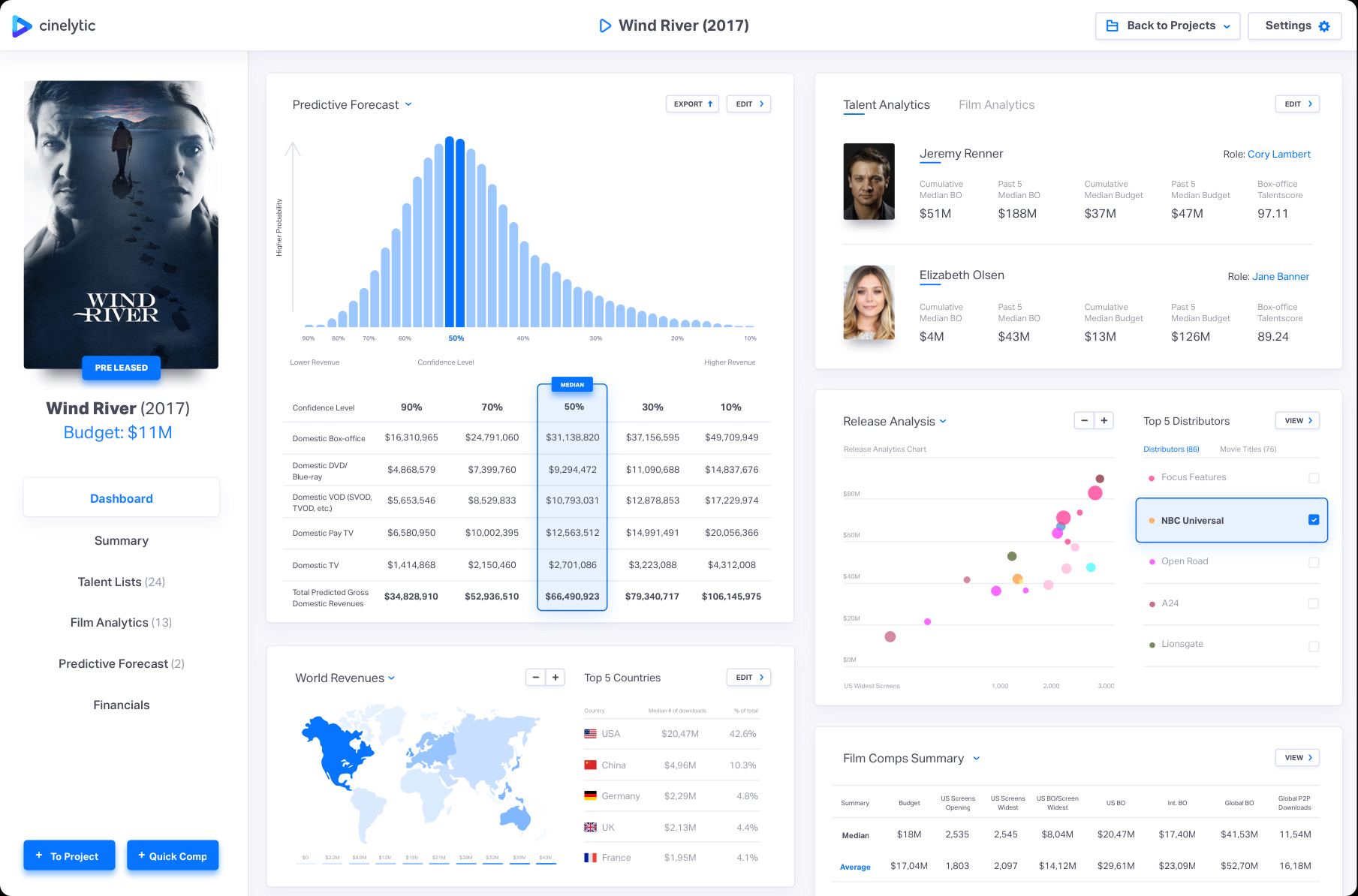
Another problem - algorithms, by their very nature, are very conservative. They work on the basis of an analysis of what worked in the past. But this does not mean that the same projects will always work in the future. Machines do not follow cultural shifts, do not feel the current taste of the audience and are biased about new ideas.
Such “built-in” conservatism is now a challenge to the entire AI industry. For example, few people can work with artificial intelligence better than Amazon. But even this company last year was forced to stop using AI-tools that help with the hiring of programmers. It turned out that he (in fact, without joking) was biased towards female candidates. The fact is that the algorithms were trained on the current state of the company, where men are mainly engaged in the development of software. The system apparently realized that men "come in" more often. And just started to underestimate in the issuance of any resume, which contained the word "woman." If it hadn’t been noticed in time and the algorithm had not been turned off, in a few years there would be almost no women developers at Amazon.
Kang Zhao offers another example - from the film industry. Fantasy action "Warcraft" 2016. It was impossible to correctly predict his system fees at their current level. They would need to understand how popular this MMORPG was, to clarify how the audience treats it now, to consider thousands of external factors, to what part of the plot the film is trying to adapt (if it were the story of the Lich King, any fan of the saga would say, the profit of the film would have been much higher).

As a result, the film failed in the United States, collecting only $ 24 million on its first weekend. But - in the end it turned out to be a very good commercial success. All thanks to China, which, pining for the saga, went to him in flocks. There "Warcraft" has become the most successful foreign film of all time. But the AI algorithms simply did not have any historical data that would help predict such a result.
Similar stories are found in the predictions of ScriptBook for 2017-2018. The debut film Jordan Peel "Off" system correctly approved. But she predicted $ 56 million in fees - instead of real $ 176 million. Algorithms also warned not to sponsor the film “Woe-Creator” with James Franco. But that, thanks to the cult popularity of "Rooms" as the worst picture of all time, was more or less successful, and brought the creators $ 21 million with a budget of $ 10 million.
Andrea Scarso, director of the British investment firm Ingenious Group, agrees that this problem of conservatism is present. His company uses Cinelytic software to make decisions about film investments. There is help, he says, and it’s good, but for now, you can only use AI as an auxiliary tool to confirm your own conclusions.
Among the clients of ScriptBook are several “largest Hollywood studios,” but contracts prohibit companies from even saying their names:
People do not want to be associated with AI, because the general opinion is that AI is bad. Everyone wants to use it. But no one wants to say that they use it.
Skepticism is now there, but the opinion is changing quite quickly. Andrea Scarso says there is one factor that made Hollywood stop ignoring big data: Netflix. The streaming service, which gathers more and more viewers every year, continues to argue that its information-oriented approach to films and TV shows is a big plus. The company tracks the actions of millions of subscribers. And he understands, for example, what mini-image they should put in order to increase the likelihood that they will click on it and go to watch a movie.
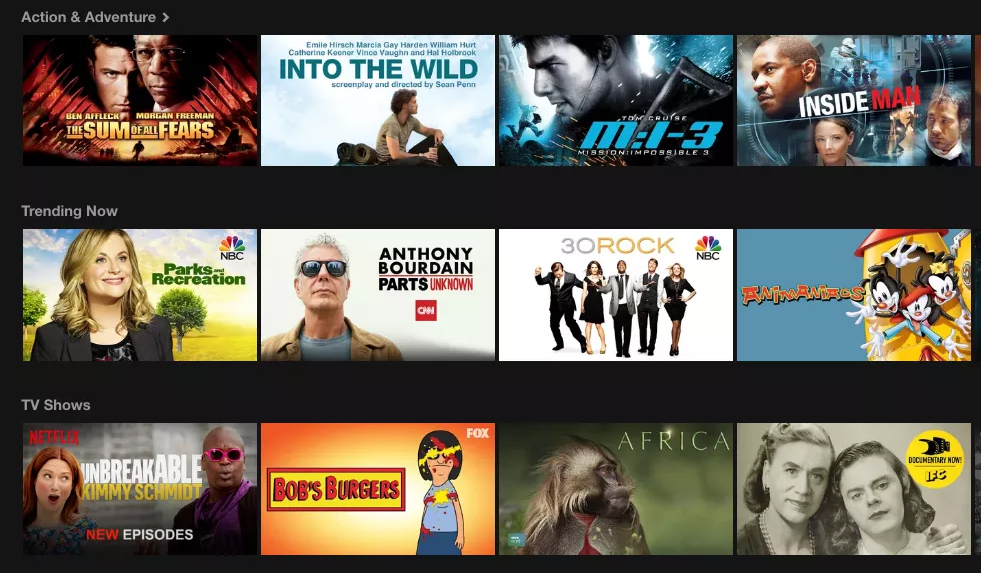
One of Netflix top managers, Todd Yellin, boasted about their AI brain in 2016:
We have one big global algorithm, and it helps a lot, because it takes into account the tastes of users from all over the world.
The company claims that its recommendation algorithm itself brings at least $ 1 billion a year to it. Given Netflix's cost of creating original content (expected to exceed $ 15 billion this year), even the most conservative Hollywood producers are beginning to realize that working with algorithms and even partially relying on them is not such a bad idea.
ScriptBook data analyst Michael Ryulens says that the transformation of the industry is very noticeable:
When we first started four years ago, we met with big companies in Hollywood. They all treated us super skeptical. Now everything has changed. Companies conducted their own research, they waited to understand what predictions can make software. And, gradually, they learned to trust the algorithms.
They are starting to take our technology. It just took time for them to understand its benefits.
PS Buying in the US is profitable with Pochtoy.com. Delivery with us - from $ 11.99 per pound. Plus - 7% discount when registering with a promotional code HABR. And if you would like, on the contrary, to sell your goods in US stores, we now have a new service - complete filment .
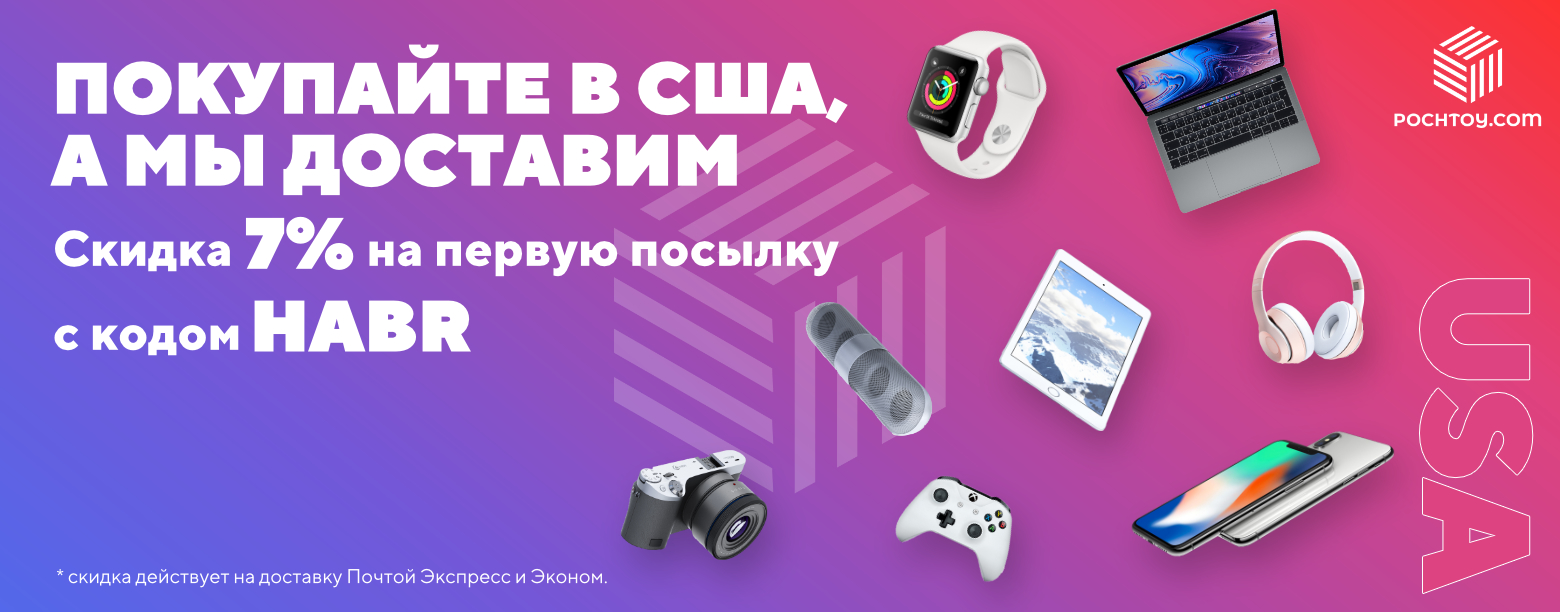
Source: https://habr.com/ru/post/455501/
All Articles